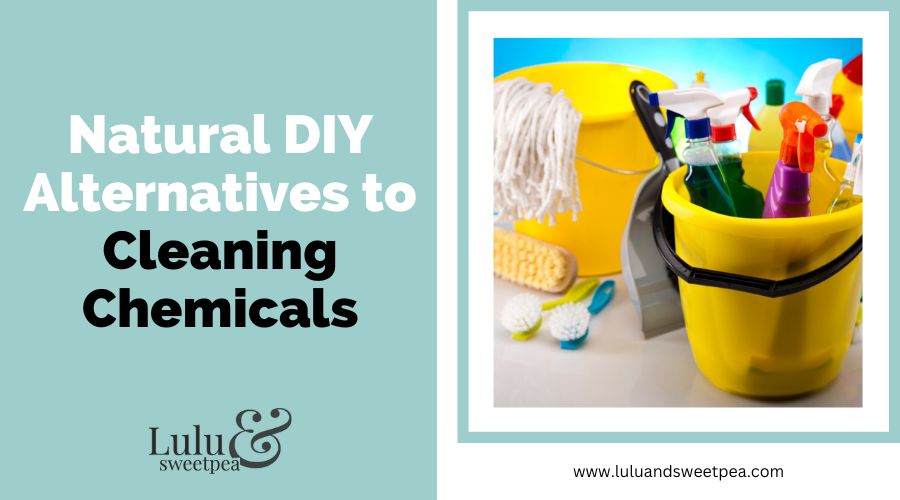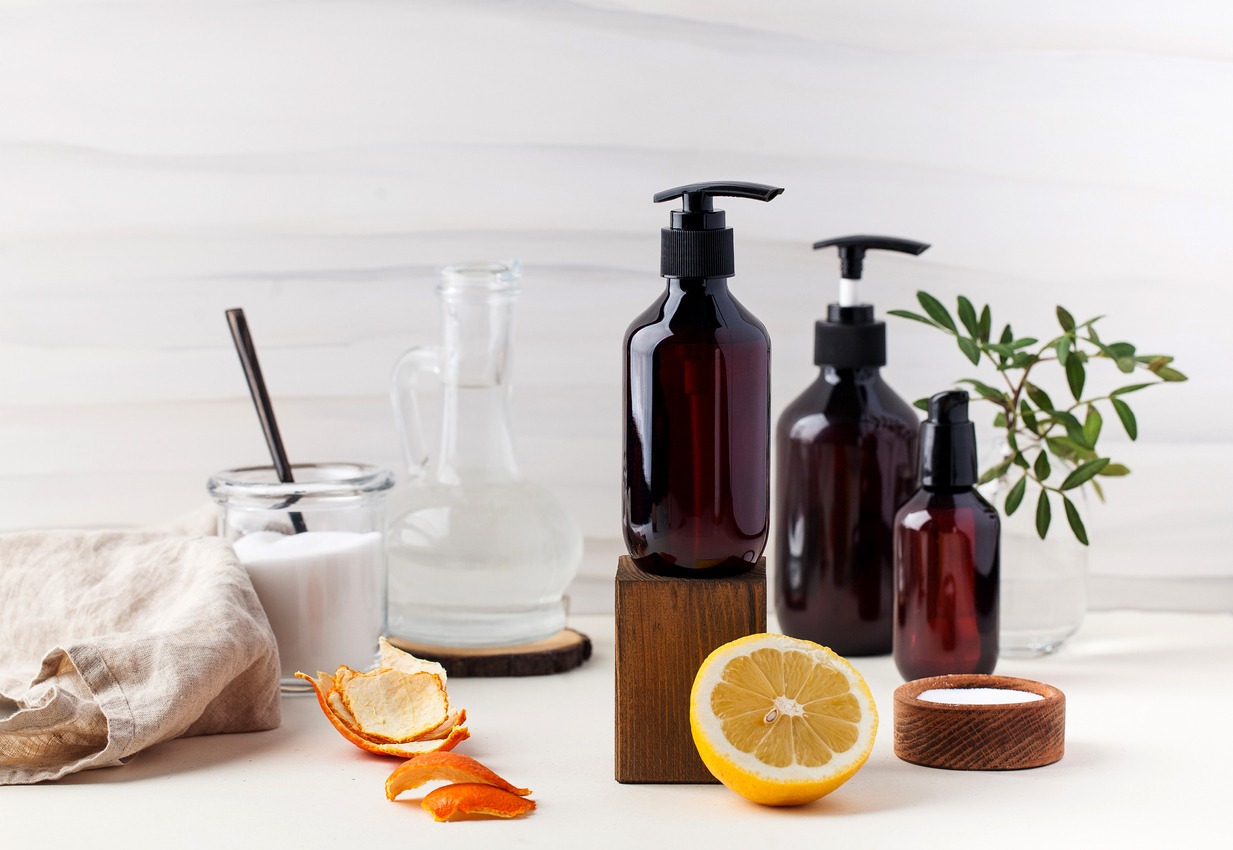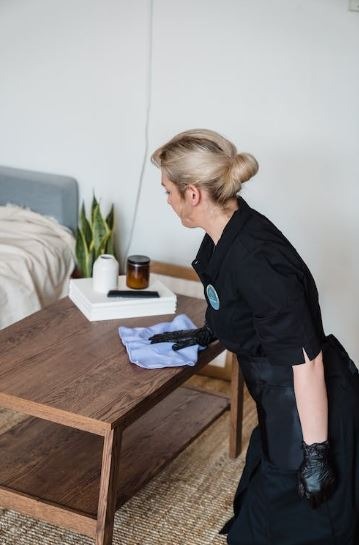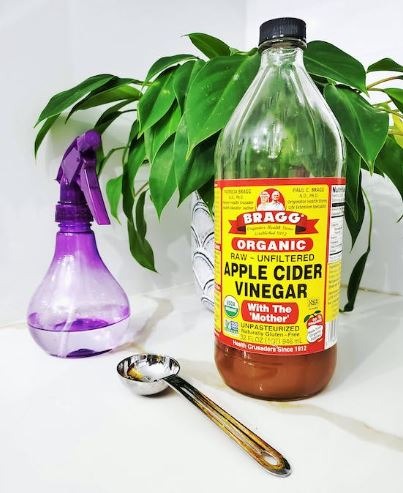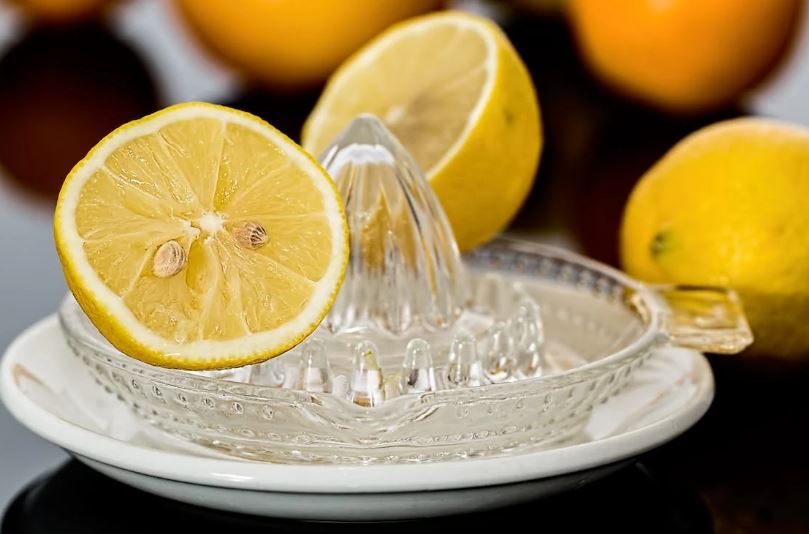Maintaining a clean environment at home is often a top priority for people who want to live a healthy lifestyle. To achieve that clean living space dream, most people turn to their go-to brands of cleaning products. But commercial cleaning supplies often contain chemicals that can harm the body and the environment. Fortunately, store-bought cleaning products loaded with potentially harmful chemicals aren’t the only way to get rid of dirt, stubborn stains, and grease build-up.
Natural DIY cleaning products can be alternatives to commercial cleaning brands; these non-toxic and homemade cleaning products not only provide a healthier substitute to store-bought cleaning products, but natural DIY alternatives can also help you save some money! Here is a list of natural DIY alternative cleaning products, a guide on how to make them, and instructions on how to use them.
White Vinegar for Water Stains
One way to remove those stubborn water stains from the sink top, toilet, or shower glass is to use white vinegar.
To use vinegar as a cleaning agent, it can be directly applied to the surface, diluted with water, or boiling it up first, depending on your preference or the thickness of the stain you wish to remove. After applying the vinegar to the surface you want to clean, give it a few minutes to soak in the acetic acid on the vinegar to loosen up the stains that cling to the surface. Give the vinegar a few minutes to do its magic. After letting it soak, do your part and do some scrubbing.
Depending on the object you’re scrubbing, you can use a regular brush or a non-scratch sponge. After scrubbing the surfaces, rinse them with soapy water to wash off the vinegar smell.
Oil for Furniture
A natural way to give wooden furniture its old shine back is to use oil to clean and polish it. You can use olive oil and vinegar solution or essential oils like lemon and lavender oils, depending on your preference and what you have to clean and polish your home’s furniture.
For the olive oil vinegar mixture, to create the mixture, mix three parts olive oil to 1 part vinegar, then using a cloth, gently rub it on the furniture for deep cleaning. Leave it for a couple of minutes for the vinegar to loosen any dirt build-up, gently buff it, and then let the remaining solution air dry.
If you’re not a fan of the vinegar and olive solution, you can also opt to make lemon-olive oil solution or use scented essential oils. If you want that fresh lemon scent, you can make an olive oil and lemon juice cleaning solution by mixing two parts of olive oil with 1 part of lemon juice or using lemon essential oil.
Gently apply the lemon-olive solution or lemon essential oil to the furniture, buff it, then let the residual fluids air-dry. If you’re looking for a menthol scent, you can clean and polish your furniture with peppermint essential oil. Peppermint has antiseptic properties, a relaxing menthol smell, and keeps the bugs away too! Add a few dollops of peppermint essential oil onto a soft cloth, gently apply it to the surface, buff it, and let it air dry.
You may also opt to use other essential oils, depending on what is most convenient for you or the scent you’re going for; just follow the apply-buff-dry sequence and remember to use a soft cloth so you don’t scratch the furniture.
Apple Cider Vinegar for Mold
Places that are frequently humid inside the home can become conducive environments for mildew and mold growth. To prevent the growth of mold colonies inside the home, areas need to be kept clean and dry; however, this may be a difficult task for areas that frequently get wet, such as bathrooms and kitchen sinks. In those cases, apple cider vinegar can be used as a cleaning agent to discourage mildew growth and mold colonies’ formation.
The acetic acid in apple cider has antiseptic and antimycotic properties, which can stave off the growth of mold colonies. And aside from discouraging mold growth, apple cider also deodorizes surfaces. To use, a sponge or cloth can be soaked in apple cider vinegar and then wiped over areas frequented by mildew growth, or hard-to-reach areas such as nooks, crannies, and crevices, it can be sprayed.
Let the apple cider vinegar soak and penetrate the targeted surfaces for a while, and longer if the surface already hosts mold, then scrub it off.
Lemon Juice for Grease
The build-up of grime and grease in the oven and over stove tops is often a problem for people who spend much of their time in the kitchen. Besides making the surface icky and the place looks unappealing, the grease and grime can also encourage bacteria and mold growth which can contaminate food!
Luckily the answer to your kitchen grease woes may be closer than you think. The lemons sitting inside your fridge or on the kitchen counter may just be the solution to your kitchen grease and grime problems. To use lemons as a cleaning agent against grime and grease, add sliced lemons to water, then boil until the lemon slices turn brownish.
If you mean to clean the grime and grease off your oven, then use it to boil the lemons. Don’t cover the boiling lemons inside the oven, so the steam has ample space to circulate. The steam from the boiled lemons will loosen and start breaking-up grease spots inside the oven.
After boiling the lemons, the lemon-water mixture can be used to wipe greasy areas. Soak a cloth or sponge in the lemon-water mixture, then wipe over grease spots. The oils from the lemon’s skin will cut through the grease, while the lemon’s antimicrobial and antiseptic properties can discourage the growth of bacteria and fungi.
Sometimes the best cleaning solution is just one you can find inside your home and your pantry.
With common household ingredients like vinegar, baking soda, and essential oils, you can prepare a variety of homemade cleansers, from all-purpose cleaning sprays for furniture to scouring pastes for showers and bathroom tiles to hardwood floor polishes.
